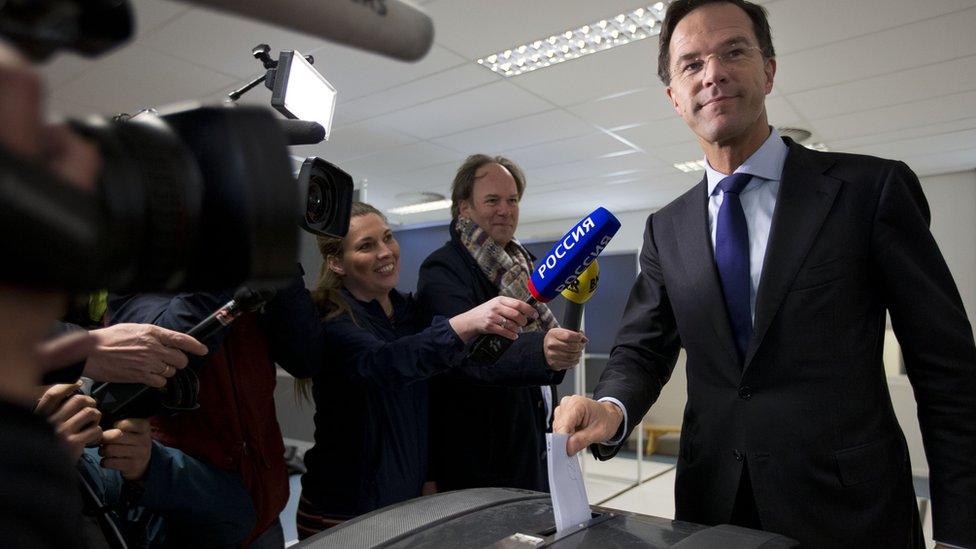Dutch referendum a difficult result for EU and Ukraine
- Published
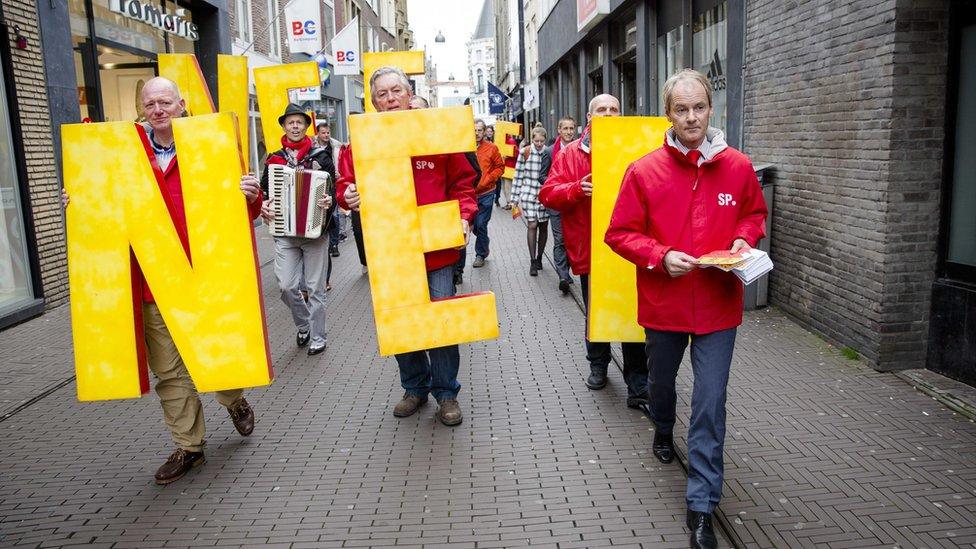
The "No" campaign focused on hostility to the EU rather than the trade deal with Ukraine
Dutch voters have rejected an EU trade deal with Ukraine, but on a low turnout and on an agreement that few people will have read.
But what does the referendum mean for the EU, for Ukraine's future relationship with the 28-member bloc, and Dutch democracy?
BBC correspondents report from The Hague, Kiev and Brussels.

Dutch dilemma - by Anna Holligan, BBC News, The Hague
The Dutch have delivered a resounding no, with caveats.
The referendum was ostensibly about Ukraine - but the No campaigners weren't concerned with the intricacies of the trade deal. The main architect of the referendum boasted he hadn't even read the association agreement.
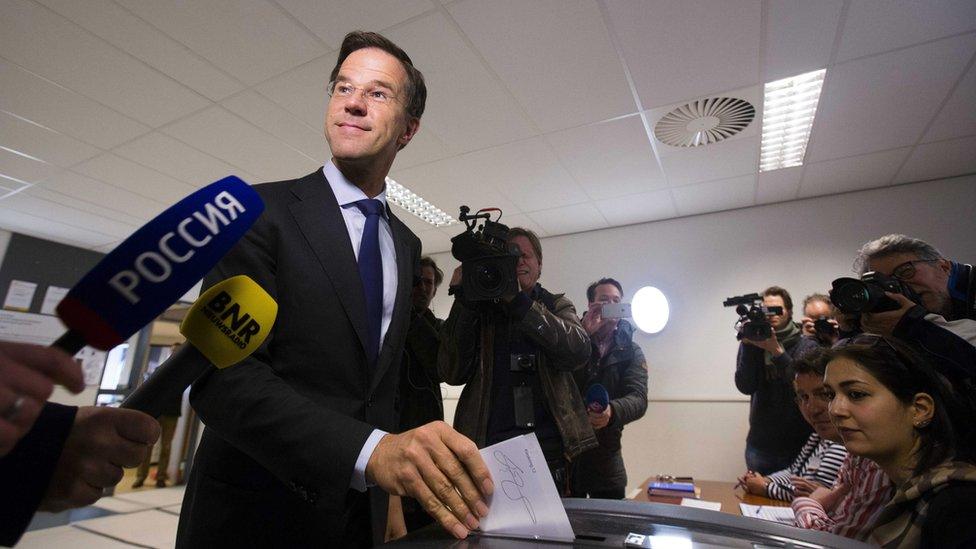
Prime Minister Mark Rutte accepted the agreement could not be ratified by the Dutch in its current form
This exercise in direct democracy was presented as an opportunity for the electorate to express their discontent at what many consider unwanted expansionism and a lack of democratic accountability within the EU. The Yes campaign was notable in its absence.
The Dutch debate has been so multi-layered, the results are open to interpretation.
It is certainly symbolic that one of the founding fathers of the EU now appears to be a hotbed of Euroscepticism. Two-thirds of the electorate didn't cast their ballot, so some argue the result cannot be taken as a true reflection of anti-EU sentiment.
Interior Minister Ronald Plasterk expressed a sentiment that many people here share: the rules were confusing, primarily the 30% turnout rule that may have acted as a disincentive for those who supported the deal to go out and vote in favour.
Those who did may be wishing they hadn't bothered. If they'd stayed at home, turnout would have fallen below the 30% threshold thus invalidating the result.
Dutch PM Mark Rutte has promised to at least acknowledge the result, and politically it will be hard to ignore.
But the Dutch parliament had already backed the agreement, the vote was non-binding and legally speaking the government isn't obliged to listen to a vote that, after all, involved barely a third of the electorate.
The Dutch are masters of compromise - just Google "polder mentality". Expect weeks or months of protracted discussions in The Hague, and Brussels. These are uncharted waters; the Dutch government will need time to work out how to navigate them.

Blow for Ukraine - by Tom Burridge, BBC News, Kiev
The Ukrainian government is adamant that its wide-ranging deal to align itself with the EU will remain on course, despite the Dutch No vote.
There is a huge amount of political will, both among top EU officials and powerful EU member states, namely Germany, for Ukraine's post-revolutionary political order to succeed.
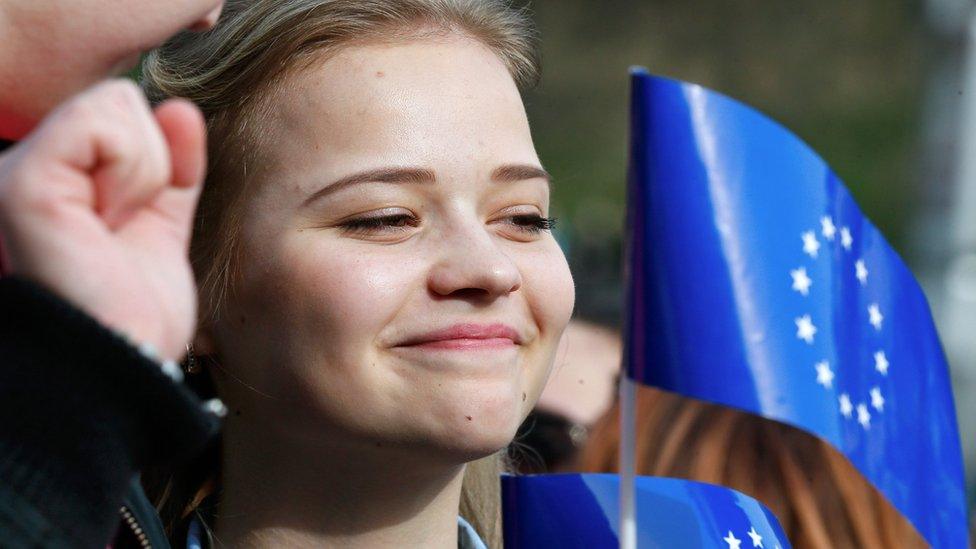
The EU association deal with Ukraine should not be confused with membership of the 28-member bloc
The EU has already invested financially and politically in this country. EU officials are based at the parliament, trying to help broker deals. And the EU has offices within Ukrainian government ministries, where officials work with their Ukrainian counterparts to try to reform Ukraine's infamously clumsy and sometimes corrupt bureaucracy.
The EU-Ukraine association agreement should not be confused with EU membership. The consensus is that Ukraine is a long way from that, although the deal is a step in that direction.
Moldova and Georgia have made similar deals with the EU, which aim to break down trade barriers and create more transparent and efficient government institutions.
The trade deal has already been ratified by the other 27 EU member states. So the No vote complicates the Dutch government's position, even though the No campaign was more about the EU than Ukraine and the association agreement.
Ukraine's President Petro Poroshenko has insisted the referendum result will "not be a strategic obstacle for Ukraine on the path to Europe". And Dmytro Kuleba, a senior foreign ministry official, told me that "Dutch Eurosceptics cannot take Ukraine hostage to express dissatisfaction about the EU".
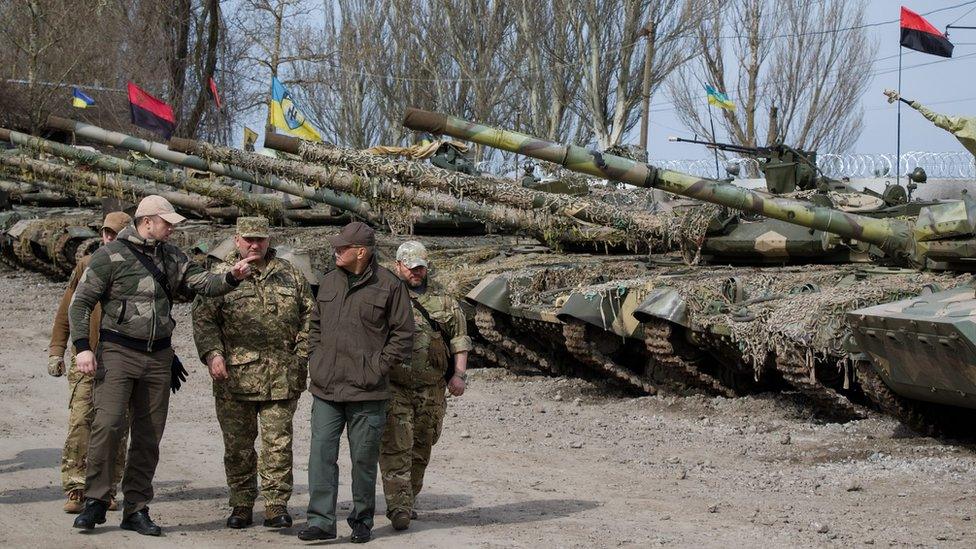
Ukraine's government is struggling with several big issues besides its trade deal, including conflict in the east
The result is a blow to Ukraine's morale, when domestic political uncertainty and infighting have increased scepticism over the Ukrainian government's EU-backed reform process.
But unless there is a much more fundamental political shift elsewhere in the EU, the Dutch referendum result will have little impact on Ukraine.
The government in Kiev has far bigger issues to contend with: a war in the east, Russia's annexation of Crimea, a problem-plagued economy, a political crisis and a battle to end deep-rooted corruption within state institutions.

Two problems for EU - by Gavin Lee, BBC News, Brussels

Mr Juncker was said to be sad about the Dutch result
When the Dutch referendum was first announced, European Commission head Jean-Claude Juncker warned that a No vote "could open the doors to a continental crisis" and only Russia "stood to benefit".
He was unavailable for comment at the Commission's daily briefing on Thursday, but the session was dominated by questions about the vote, and his chief spokesman said Mr Juncker was sad about the vote's outcome.
There are two major issues now for the EU.
First, how to press ahead with a flagship deal that in effect makes Ukraine a member of the EU single market, in exchange for adopting EU regulations and standards. It took years to negotiate and was also one of the underlying causes of the conflict that broke out in eastern Ukraine with pro-Russian separatists in 2014.
Can the deal go ahead without the support of one member, when all other countries have ratified it? Commission officials say the next steps aren't clear, and will wait for the result to be confirmed next Tuesday.
Then there's a wider question about whether this is a signal, as Dutch Eurosceptics claim, that voters are losing faith in the European Union project.
Mr Juncker has previously described his team, as "the last chance Commission to regain public trust". It's a blow for the EU, but is being dismissed, publicly at least, as a domestic issue for one member state and not representative of a wider distrust in the institutions of Brussels.
- Published7 April 2016
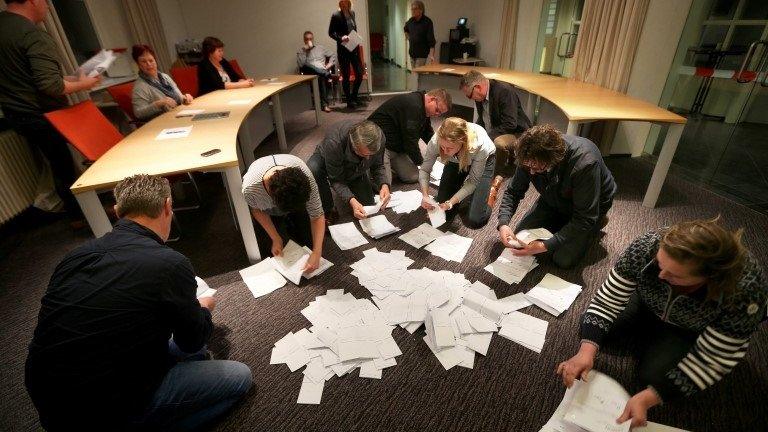
- Published7 April 2016
